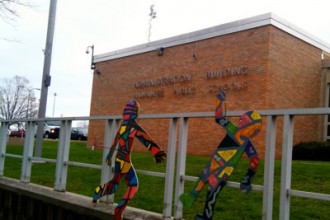 So, I suppose I should introduce myself.
So, I suppose I should introduce myself.
I’m probably not entirely a new face to many of you (though, you know, I always joked that I had a face made for blogging). That’s because from 2003 until last weekend I owned and operated a moderately popular blog at folkbum.com. After being invited to contribute here, I decided to pack up the solo shop; I’ll be dividing my posts now between School Matters MKE and bloggingblue.com (which, spoiler alert, should tell you something about my politics). Plus I’m on twitter at @folkbum.
But to do this properly: I’m a teacher. I’m not going to get all maudlin about it–if you want to read some long, rambly posts about what that all means to me, try one of these two, both from earlier this year. But that’s my identity; not blogger, not commentator, not whatever else might come with speaking publicly about teaching, learning, and education.
I teach high school English at Bay View Middle and High School. I am working on, but don’t entirely have worked out yet, my Grand Everything Theory of Urban Teaching (future book title: Wanna Be Like Me? GET OUT). Which is to say that, after 15 years in the classroom I’m still learning.
But here are a couple of things I know. One, what’s happening–and what’s not happening–in the Milwaukee Public Schools is unacceptable and unsustainable. While there are plenty of MPS teachers out there working small miracles every day, this generation of Milwaukee’s children is not going to be saved by small, even if widespread, miracles worked one at a time.
Two, that said, I do not think the situation on MPS is hopeless. If I didn’t have hope, I wouldn’t get up every morning and go do what I do. Nor would the thousands of other people who make MPS run every day.
And three, there is no quick fix. No one blog post or charismatic figure or silver bullet is going to solve every problem of a large city school system. I think that should be obvious by now: there is not one silver-bullet reform out there that hasn’t been tried in MPS in the last two decades.
What I think it will take instead is a concerted effort on the part of all the stakeholders involved, including, and I would suggest mostly, and effort to address the larger problems of the city of Milwaukee. The city’s poverty rate, crime rate, unemployment rate are all as unacceptable and unsustainable as the districts’ graduation rate.
And that world outside the schools, after all, is where my–our–students spend most of their time. Of course the city and its schools have their fortunes securely tied to each other, making it all too easy to descend into the kind of negative feedback loop that surely exists here.
But as I said, there is hope. There has to be.
So hello, again, Milwaukee.

